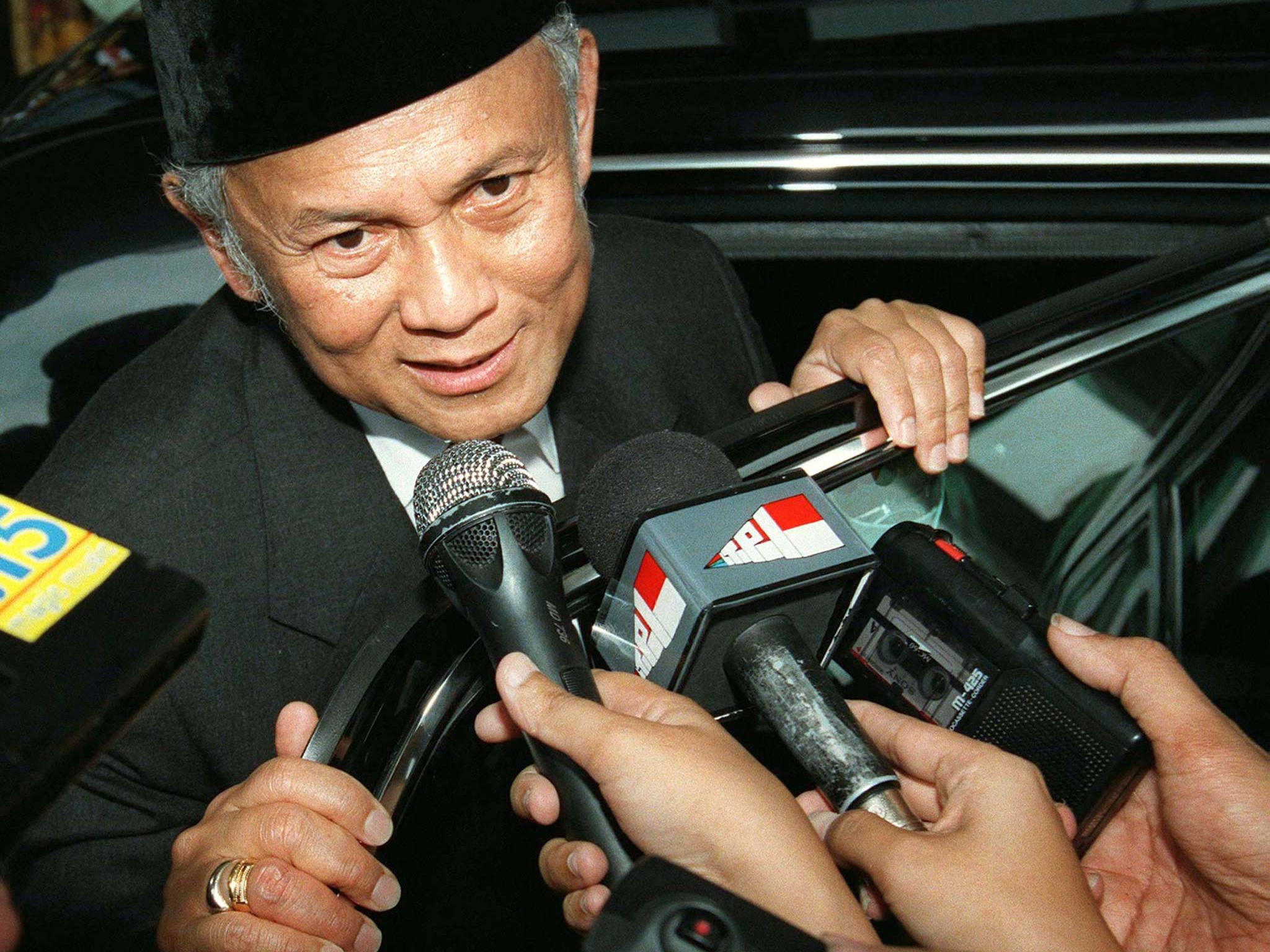BJ Habibie: Indonesian leader whose short tenure was marked by a shift to greater democracy
He attempted to steer a path away from the dictatorship of his predecessor Suharto, and set in train the liberation of Timor-Leste

Though he was president of Indonesia for just 512 days, Bacharuddin Jusuf Habibie, who has died aged 83, had an impact considered to be far out of proportion to the brevity of his tenure, marking as it did the beginning of a more liberal era in his country’s history with a move towards democracy after General Suharto’s three-decade dictatorship.
BJ Habibie (as he was known) was born in Parepare Afdeling in the Dutch East Indies. His father, who died when he was 14, was an agriculturist and his mother came from an aristrocratic Javanese family. Habibie was the fourth of eight children.
Habibie travelled to the Netherlands to study aviation at the Delft University of Technology. However, the West New Guinea dispute, a conflict over territory between Indonesia and the Netherlands, interrupted his studies and he completed his degree at the RWTH Aachen University in Germany. He stayed on in Aachen as a research assistant while completing a doctorate.
Habibie was by now working for Waggonfabrik Talbot, designing train wagons, but he turned down the chance to progress in the rail industry to complete his dissertation in aerospace engineering and join Messerschmitt-Bolkow-Blohm. There, he developed three eponymous theories in thermodynamics (the Habibie Factor), construction (the Habibie Theorem) and aerodynamics (the Habibie Method). He also worked on the development of the Airbus A300B, and was promoted to vice president in 1974.
That year, President Suharto, who saw the engineer as an important part of his drive to industrialise the nation, wooed Habibie back to Indonesia. Habibie began this new stage of his career at the state oil company Pertmamina but two years later was made CEO of Industri Pesawat Terbang Nurtanio, the state-owned business that would become Indonesian Aerospace. And in 1978, he made a step into government as minister of research and technology. This was the beginning of more than 20 years continuous service as a member of the Indonesian cabinet. Simultaneously, he headed 10 state-owned industries, including arms and energy.
Habibie knew how to handle Suharto’s vanities. He referred to his boss as “SGS” (Super Genius Suharto) and cultivated the favour of the president’s wider family. It looked as though Habibie was being rewarded for his loyalty when Suharto named him as his vice presidential running mate in 1998. However, having won the election, Suharto suddenly resigned, leaving Habibie the top job and all the accompanying political and economic mess. Few expected Habibie to stay long in the role. He admitted in his memoir: “The slightly more optimistic predicted that I would not last more than 100 days.”
Once in power, however, Habibie seemed set to do things differently. He vowed to tackle the corruption of his predecessor’s regime, he lifted restrictions on political parties and the media and, during a speech on National Day, apologised for human rights violations under Suharto (although a day earlier he had decorated Suharto’s wife and son).
Habibie also turned his attention to Timor-Leste. The former Portuguese colony had been illegally occupied by Indonesia since 1975. Now Habibie offered the territory a referendum on self-determination. When the resulting vote for independence was met with violence from pro-Indonesian militias, Habibie allowed the intervention of a UN peacekeeping force. He also ordered the release of Xanana Gusmao, the resistance leader who would become independent Timor-Leste’s first president.
Alas, Timorese independence did not improve Habibie’s popularity at home. He had inherited a terrible economy from Suharto, with soaring inflation and unemployment. Meanwhile, his promise to tackle corruption rang hollow as charges against Suharto were dropped and several of Habibie’s colleagues were named in a banking scandal. As the 1999 presidential elections approached and Habibie’s support dropped below 10 per cent, he withdrew from the race.
Habibie spent much of his retirement in Germany. He wrote an account of his presidency entitled Decisive Moments and invested in a popular tourist resort, Batam Island. When his wife died in 2010, he published a book about their relationship in her honour. (Habibie and Ainun was subsequently made into a film series.)
Whether the changes that began in Indonesia under Habibie can be attributed to his personal conviction or to external pressures is unclear, but there’s little doubt that Habibie was a better president than Suharto.
On a wreath for his late friend, Gusmao, the man Habibie made president of newly independent Timor-Leste, declared: “Timorese people will remember you forever.”
Habibie is survived by two sons.
BJ Habibie, former Indonesian president, born 25 June 1936, died 11 September 2019
Join our commenting forum
Join thought-provoking conversations, follow other Independent readers and see their replies
Comments
Bookmark popover
Removed from bookmarks